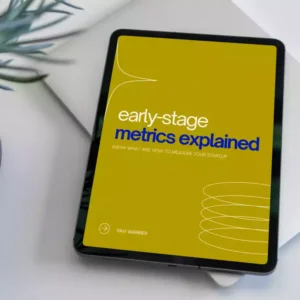TL;DR
To create a powerful visual hierarchy in your investor pitch deck, focus on using size and scale, color, contrast, alignment, and repetition. Make your title slide compelling and use visuals to connect emotionally with investors. Incorporate data visualizations to engage critical thinking and customize your design to match your audience’s preferences.
Introduction to Visual Hierarchy
Creating a pitch deck that captivates investors is crucial for securing funding. A strong visual hierarchy not only makes your pitch deck visually appealing but also ensures that your key messages are effectively communicated. In this guide, we’ll explore several foundational elements that can help you design a compelling pitch deck: size and scale, color, contrast, alignment, repetition, and data visualizations.
Importance of the Title Slide
Your title slide is often the first impression investors will have of your deck. It should be visually striking and succinctly present the essence of your business. Think of the title slide as the cover of a book. A poorly designed cover may deter potential readers and, similarly, an unappealing title slide can lose investor interest.
A good title slide might include:
- The company logo
- A compelling tagline
- Minimal but impactful imagery
Make the title slide clean yet engaging to hook the investors right from the start.
Utilizing Size and Scale
Bigger elements naturally draw more attention. Use size and scale strategically to highlight the most important parts of your pitch deck. For example, headlines should be larger than body text, and key data points could be emphasized with larger fonts or graphics.
Consider this example: If you’re introducing a groundbreaking product, use a large, high-quality image of the product. Pair this with a sizeable, bold headline summarizing its key benefit. This makes the product the focal point, ensuring it grabs the investor’s attention immediately.
Effective Use of Color and Contrast
Color can be a powerful tool for creating visual hierarchy. Consistent use of brand colors can establish a cohesive look, while contrast can help draw attention to critical information. High contrast between text and background makes the text more readable and ensures essential points stand out.
For example, if your pitch deck primarily uses blues and whites, consider using a vibrant color like red for calls to action or to highlight key statistics. This contrast will make these elements pop and stand out to viewers.
Employing Alignment and Repetition
Alignment and repetition contribute to a clean, professional look. Proper alignment ensures that elements are placed in relation to each other cohesively, leading the viewer’s eye through the content logically. Repetition of visual elements like fonts, colors, or shapes builds consistency, making the deck easier to follow.
Imagine each slide maintaining a similar layout. If the headlines are always left-aligned and the images always appear on the right, the consistency makes it easier for investors to navigate through your deck without confusion.
Storytelling through Data Visualizations
Visual representations of data can be far more engaging than text alone. Charts, graphs, and infographics not only break up the monotony of text but also make complex information digestible. Investors are likely interested in data-driven insights, so ensure you present your metrics effectively.
Use a bar graph to show market growth, a pie chart for market share, or even an infographic timeline of your company’s milestones. These visual aids can make your narrative more compelling and easier to understand.
Design for Your Audience
Finally, always consider the preferences and expectations of your audience. What appeals to one group of investors may not resonate with another. Understand your audience’s taste and tailor your design to meet their specific preferences. This can increase your chances of maintaining their interest and securing their investment.
If your audience consists of tech investors, a sleek, modern design might be more effective. On the other hand, if you are pitching to more traditional financial investors, a conservative and straightforward layout might be better suited.
Questions to Ask Yourself
- Does my title slide make a strong first impression?
- Am I effectively using size and scale to emphasize key points?
- Are my color choices making important information stand out?
- Is the alignment and repetition creating a cohesive look throughout my deck?
- Am I using data visualizations to simplify complex information effectively?
- Is my pitch deck tailored to the specific preferences of my audience?
Next Steps
Creating a powerful visual hierarchy in your pitch deck is essential for effectively communicating your message to potential investors. Start by focusing on the fundamental design elements discussed here: size and scale, color, contrast, alignment, and repetition. Always keep your audience in mind and use data visualizations to make your story compelling. Review each slide critically and make adjustments as necessary until your deck flows logically and looks professional. Take these steps seriously, and you’ll be well on your way to delivering an engaging and successful pitch.





